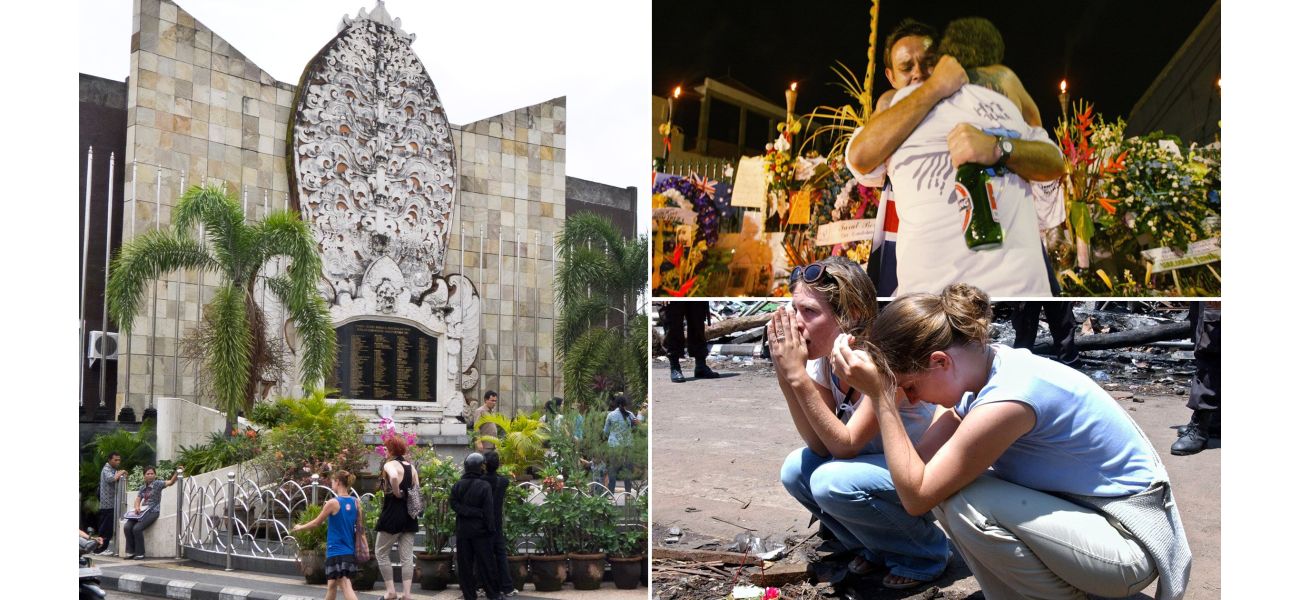A pair of explosives caused the deaths of 200+ individuals in a terrorist strike on a nightclub.
Two bombs exploded at a popular tourist spot in Indonesia, killing 202 and injuring many others.
October 12th 2024.

The bombings in Indonesia left a lasting impact on the country, even after 22 years since the tragic incident. The Bali nightclub bombing, which claimed the lives of 202 people and injured hundreds more, continues to be a somber reminder of one of Indonesia's deadliest terror attacks. The victims came from over 20 different countries, including 28 British citizens. Memorials have been erected all around the world to honor and remember those who lost their lives in the bombing.
The site of the explosion at Paddy's Pub has since been transformed into a memorial for the victims, serving as a poignant reminder in an area known for its lively clubs and nightlife. The then-chief of police described the bombings as the worst act of terror in Indonesia's history, and although the country has experienced other attacks since then, none have had the same level of impact.
The Bali bombing occurred on October 12, 2002, at 11:05 pm. It was a double bombing, with the first bomb being detonated inside Paddy's Pub by a suicide bomber carrying a bomb in his rucksack. This was followed by a much more powerful car bomb exploding outside the Sari Club, just across the road, only 20 seconds later. Another smaller bomb, reportedly filled with human excrement, was also detonated outside the US consulate in Densapar.
Three years later, the United States-Indonesia Society released a report detailing the activities of the bombers leading up to the explosions. It was revealed that they had purchased a Yamaha motorbike and a van, which they used to plant the bomb at the US consulate. Two bombers were then driven to Kuta's nightclub district, with one putting on a suicide vest and entering Paddy's Pub, while the other was instructed to arm the bomb in the van. After being picked up on the motorbike, two organizers headed back to Denpasar and used a mobile phone to detonate the bomb at the US consulate. The suicide bombers then detonated their explosives vest and the car bomb.
The Bali bombing took place in the popular tourist area of Kuta Beach during one of the busiest periods of the year. Many sports teams were celebrating the end of their season, and among the victims were members of the Singapore Cricket Club's rugby team, the Taipei Baboons amateur rugby squad, the Hong Kong FC Vandals rugby team, and the ISCI Komodos rugby team. The attack left hundreds of people injured, with many still suffering from the physical and emotional scars.
Among the 28 British victims were individuals from various backgrounds and professions. Timothy Arnold, a lawyer from Oldbury, was touring with the Singapore Cricket Club's rugby team. Neil Bowler, a sales and marketing executive from Worcestershire, was also part of the same team. Daniel Braden, a marketing manager from Brighton, was on a tour in Bali with the Taipei Baboons. Christopher Bradford, originally from Romford, was the captain of the Singapore Cricket Club's rugby team and had been living in Singapore for four years. Jonathon Ellwood, the director of an international school in Vietnam, was on holiday in Bali and was due to attend a conference. Lucy Empson and Emma Fox, both from London, were friends and were on holiday together. Ian Findley, a car mechanic from County Durham, was on vacation with a friend who survived the attack. Laura France and Natalie Perkins, cousins from Sheffield, were traveling during their gap year. Marc Gajardo, a mechanic from Cornwall, was with his girlfriend Hanabeth Luke, who survived. James Hardman, a member of the Taipei Baboons rugby club, was competing in a tournament in Bali. Tom Holmes, a member of the Hong Kong FC Vandals rugby team, was also in Bali for a competition. Paul Hussey, a hotelier originally from Kent, was living in Bali and running two hotels on the island. Christopher Kays, a member of the Singapore Cricket Club's rugby team, was on tour in Bali. David Kent, a managing director for a multinational company, was also part of the same team. Annika Linden, a hotel and tourism consultant from Surrey, was traveling with her fiance Mark Weingard and the Hong Kong rugby team. Dan Miller, a lawyer from London, was with his wife Polly, who was injured in the attack.
The Bali bombings not only affected Indonesia but also had a global impact, with victims from different countries and backgrounds. It serves as a tragic reminder of the devastating consequences of terrorism and the importance of remembering and honoring those who lost their lives.
The bombings that struck Indonesia were truly devastating. Even now, 22 years later, the impact of the horrific attack can still be felt. It was October 12, 2002, when two bombs were detonated at one of Indonesia's most popular tourist destinations, the bustling Kuta Beach area. The explosions claimed the lives of 202 people and left hundreds more injured. The victims hailed from over 20 different countries, including 28 British citizens. The world mourned the loss of so many innocent lives, and memorials were erected around the globe to honor and remember those who perished in the bombings.
In the aftermath of the attack, one of the explosion sites was transformed into a memorial for the victims, a solemn reminder of the deadliest terror attack in Indonesia's history. The chief of police at the time declared it as such, and though the country has faced other attacks since then, none have had the same profound impact as the Bali bombings.
The bombings occurred during a busy tourist season, with many sports teams in the area celebrating the end of their season. Some of the victims were members of the Singapore Cricket Club's rugby team, the Taipei Baboons amateur rugby squad, the Hong Kong FC Vandals rugby team, and the ISCI Komodos rugby team. The devastation was widespread, with many innocent people caught in the crossfire.
The attack began at 11:05 pm, when a suicide bomber detonated a bomb hidden in his rucksack inside Paddy's Pub. The blast caused chaos as terrified and injured patrons ran outside to escape. But just 20 seconds later, a much more powerful car bomb hidden in a van was detonated outside the Sari Club, located just across the road. Minutes later, another bomb, reportedly filled with human excrement, was detonated outside the US consulate in Denpasar. The devastation was unimaginable, and the impact was felt not only in Indonesia but around the world.
In the months and years following the attack, investigations and reports were released, detailing the bombers' activities leading up to the explosions. A Yamaha motorbike and a van were purchased, and the bike was used to plant the bomb outside the US consulate. Two bombers were then driven to the nightclub district in Kuta, with one putting on a suicide vest to enter Paddy's Pub, and the other instructed to arm the bomb in the van. After being picked up on the Yamaha, two planners headed back to Denpasar to detonate the bomb outside the US consulate using a mobile phone. Finally, the suicide bombers triggered their explosives vest and the car bomb, leaving behind the Yamaha at a place where it was eventually found by a caretaker.
The Bali bombings left an indelible mark on the world and the lives of those who were affected. The attack occurred in an area known for its lively clubs and nightlife, but the aftermath turned it into a place of mourning and remembrance. The victims included people from all walks of life, including a lawyer, sales and marketing executive, marketing manager, and director of an international school. Each had their own dreams and aspirations, cut short by the senseless act of terror.
As we remember the 28 British victims of the Bali bombings, we honor their lives and the memories they left behind. People like Timothy Arnold, Neil Bowler, Daniel Braden, Christopher Bradford, Jonathon Ellwood, Lucy Empson, Emma Fox, Ian Findley, Laura France, Natalie Perkins, Marc Gajardo, James Hardman, Tom Holmes, Paul Hussey, Christopher Kays, David Kent, Annika Linden, Dan Miller, and many others who were loved and cherished by their families and friends. They will never be forgotten.
The site of the explosion at Paddy's Pub has since been transformed into a memorial for the victims, serving as a poignant reminder in an area known for its lively clubs and nightlife. The then-chief of police described the bombings as the worst act of terror in Indonesia's history, and although the country has experienced other attacks since then, none have had the same level of impact.
The Bali bombing occurred on October 12, 2002, at 11:05 pm. It was a double bombing, with the first bomb being detonated inside Paddy's Pub by a suicide bomber carrying a bomb in his rucksack. This was followed by a much more powerful car bomb exploding outside the Sari Club, just across the road, only 20 seconds later. Another smaller bomb, reportedly filled with human excrement, was also detonated outside the US consulate in Densapar.
Three years later, the United States-Indonesia Society released a report detailing the activities of the bombers leading up to the explosions. It was revealed that they had purchased a Yamaha motorbike and a van, which they used to plant the bomb at the US consulate. Two bombers were then driven to Kuta's nightclub district, with one putting on a suicide vest and entering Paddy's Pub, while the other was instructed to arm the bomb in the van. After being picked up on the motorbike, two organizers headed back to Denpasar and used a mobile phone to detonate the bomb at the US consulate. The suicide bombers then detonated their explosives vest and the car bomb.
The Bali bombing took place in the popular tourist area of Kuta Beach during one of the busiest periods of the year. Many sports teams were celebrating the end of their season, and among the victims were members of the Singapore Cricket Club's rugby team, the Taipei Baboons amateur rugby squad, the Hong Kong FC Vandals rugby team, and the ISCI Komodos rugby team. The attack left hundreds of people injured, with many still suffering from the physical and emotional scars.
Among the 28 British victims were individuals from various backgrounds and professions. Timothy Arnold, a lawyer from Oldbury, was touring with the Singapore Cricket Club's rugby team. Neil Bowler, a sales and marketing executive from Worcestershire, was also part of the same team. Daniel Braden, a marketing manager from Brighton, was on a tour in Bali with the Taipei Baboons. Christopher Bradford, originally from Romford, was the captain of the Singapore Cricket Club's rugby team and had been living in Singapore for four years. Jonathon Ellwood, the director of an international school in Vietnam, was on holiday in Bali and was due to attend a conference. Lucy Empson and Emma Fox, both from London, were friends and were on holiday together. Ian Findley, a car mechanic from County Durham, was on vacation with a friend who survived the attack. Laura France and Natalie Perkins, cousins from Sheffield, were traveling during their gap year. Marc Gajardo, a mechanic from Cornwall, was with his girlfriend Hanabeth Luke, who survived. James Hardman, a member of the Taipei Baboons rugby club, was competing in a tournament in Bali. Tom Holmes, a member of the Hong Kong FC Vandals rugby team, was also in Bali for a competition. Paul Hussey, a hotelier originally from Kent, was living in Bali and running two hotels on the island. Christopher Kays, a member of the Singapore Cricket Club's rugby team, was on tour in Bali. David Kent, a managing director for a multinational company, was also part of the same team. Annika Linden, a hotel and tourism consultant from Surrey, was traveling with her fiance Mark Weingard and the Hong Kong rugby team. Dan Miller, a lawyer from London, was with his wife Polly, who was injured in the attack.
The Bali bombings not only affected Indonesia but also had a global impact, with victims from different countries and backgrounds. It serves as a tragic reminder of the devastating consequences of terrorism and the importance of remembering and honoring those who lost their lives.
The bombings that struck Indonesia were truly devastating. Even now, 22 years later, the impact of the horrific attack can still be felt. It was October 12, 2002, when two bombs were detonated at one of Indonesia's most popular tourist destinations, the bustling Kuta Beach area. The explosions claimed the lives of 202 people and left hundreds more injured. The victims hailed from over 20 different countries, including 28 British citizens. The world mourned the loss of so many innocent lives, and memorials were erected around the globe to honor and remember those who perished in the bombings.
In the aftermath of the attack, one of the explosion sites was transformed into a memorial for the victims, a solemn reminder of the deadliest terror attack in Indonesia's history. The chief of police at the time declared it as such, and though the country has faced other attacks since then, none have had the same profound impact as the Bali bombings.
The bombings occurred during a busy tourist season, with many sports teams in the area celebrating the end of their season. Some of the victims were members of the Singapore Cricket Club's rugby team, the Taipei Baboons amateur rugby squad, the Hong Kong FC Vandals rugby team, and the ISCI Komodos rugby team. The devastation was widespread, with many innocent people caught in the crossfire.
The attack began at 11:05 pm, when a suicide bomber detonated a bomb hidden in his rucksack inside Paddy's Pub. The blast caused chaos as terrified and injured patrons ran outside to escape. But just 20 seconds later, a much more powerful car bomb hidden in a van was detonated outside the Sari Club, located just across the road. Minutes later, another bomb, reportedly filled with human excrement, was detonated outside the US consulate in Denpasar. The devastation was unimaginable, and the impact was felt not only in Indonesia but around the world.
In the months and years following the attack, investigations and reports were released, detailing the bombers' activities leading up to the explosions. A Yamaha motorbike and a van were purchased, and the bike was used to plant the bomb outside the US consulate. Two bombers were then driven to the nightclub district in Kuta, with one putting on a suicide vest to enter Paddy's Pub, and the other instructed to arm the bomb in the van. After being picked up on the Yamaha, two planners headed back to Denpasar to detonate the bomb outside the US consulate using a mobile phone. Finally, the suicide bombers triggered their explosives vest and the car bomb, leaving behind the Yamaha at a place where it was eventually found by a caretaker.
The Bali bombings left an indelible mark on the world and the lives of those who were affected. The attack occurred in an area known for its lively clubs and nightlife, but the aftermath turned it into a place of mourning and remembrance. The victims included people from all walks of life, including a lawyer, sales and marketing executive, marketing manager, and director of an international school. Each had their own dreams and aspirations, cut short by the senseless act of terror.
As we remember the 28 British victims of the Bali bombings, we honor their lives and the memories they left behind. People like Timothy Arnold, Neil Bowler, Daniel Braden, Christopher Bradford, Jonathon Ellwood, Lucy Empson, Emma Fox, Ian Findley, Laura France, Natalie Perkins, Marc Gajardo, James Hardman, Tom Holmes, Paul Hussey, Christopher Kays, David Kent, Annika Linden, Dan Miller, and many others who were loved and cherished by their families and friends. They will never be forgotten.
[This article has been trending online recently and has been generated with AI. Your feed is customized.]
[Generative AI is experimental.]
0
0
Submit Comment





